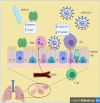Bacterial co-infections with SARS-CoV-2
- PMID: 32770825
- PMCID: PMC7436231
- DOI: 10.1002/iub.2356
Bacterial co-infections with SARS-CoV-2
Abstract
The pandemic coronavirus disease 2019 (COVID-19), caused by Severe Acute Respiratory Syndrome Coronavirus 2 (SARS-CoV-2), has affected millions of people worldwide. To date, there are no proven effective therapies for this virus. Efforts made to develop antiviral strategies for the treatment of COVID-19 are underway. Respiratory viral infections, such as influenza, predispose patients to co-infections and these lead to increased disease severity and mortality. Numerous types of antibiotics such as azithromycin have been employed for the prevention and treatment of bacterial co-infection and secondary bacterial infections in patients with a viral respiratory infection (e.g., SARS-CoV-2). Although antibiotics do not directly affect SARS-CoV-2, viral respiratory infections often result in bacterial pneumonia. It is possible that some patients die from bacterial co-infection rather than virus itself. To date, a considerable number of bacterial strains have been resistant to various antibiotics such as azithromycin, and the overuse could render those or other antibiotics even less effective. Therefore, bacterial co-infection and secondary bacterial infection are considered critical risk factors for the severity and mortality rates of COVID-19. Also, the antibiotic-resistant as a result of overusing must be considered. In this review, we will summarize the bacterial co-infection and secondary bacterial infection in some featured respiratory viral infections, especially COVID-19.
Keywords: COVID-19; SARS-CoV-2; antibiotic; bacterial co-infection; viral infection.
© 2020 International Union of Biochemistry and Molecular Biology.
Conflict of interest statement
The authors declare no conflicts of interest.
Figures

References
-
- Organization T.W.H . Coronavirus disease (COVID‐19) pandemic. 2020. https://www.who.int/emergencies/diseases/novel-coronavirus-2019.
Publication types
MeSH terms
Substances
LinkOut - more resources
Full Text Sources
Other Literature Sources
Medical
Miscellaneous

